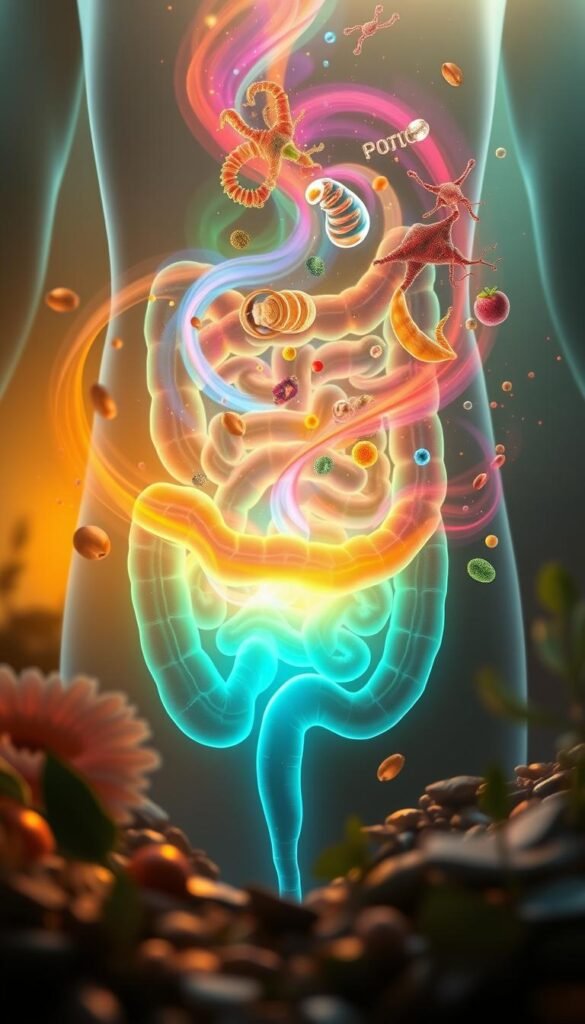Your digestive system is often called the “river of life” because it plays a vital role in your overall well-being. Just as a river needs to flow freely to stay healthy, your gut requires mindful care to function at its best. This is where the concept of colon cleansing comes into play—a practice rooted in both ancient traditions and modern science.
Historically, cultures like ancient Greece recognized the importance of maintaining a healthy digestive system. Today, many view cleansing as a way to reset the body, promoting better health and energy. However, it’s essential to approach this practice thoughtfully, seeing it as a self-care ritual rather than a quick fix.
While medical opinions on its efficacy vary, many people find that a gentle detox can support their gut and bowel health. By focusing on balance and mindfulness, you can create a routine that nurtures both your body and spirit.
Key Takeaways
- Colon cleansing supports digestive health and overall well-being.
- It’s a practice with roots in ancient traditions and modern science.
- Approach cleansing as a mindful self-care ritual, not a quick fix.
- Focus on balance to nurture both body and spirit.
- Consult a healthcare professional before starting any new regimen.
What Is Colon Cleansing?
From ancient Greece to modern wellness routines, the focus on gut health remains timeless. A colon cleanse is a practice aimed at supporting digestive health, often through methods like hydration, dietary changes, or medical procedures. While it has evolved over time, its core purpose remains the same: to help the body function at its best.
Historically, this practice dates back to ancient civilizations. The Greeks believed in the importance of maintaining a healthy digestive system. In the 1900s, its popularity declined but has since seen a resurgence in modern wellness circles.
Today, there are two main approaches: clinical methods and natural at-home practices. Clinical methods, like hydrotherapy, involve medical supervision and often use large amounts of water for irrigation. On the other hand, natural methods focus on hydration, fiber-rich diets, and herbal teas to support the body’s innate detox systems.
“The body’s natural ability to detoxify is a sacred biological wisdom that we often overlook.”
Modern diets, filled with processed foods, can disrupt the body’s natural elimination rhythms. This is where the concept of conscious cleansing comes in. It’s about aligning with your body’s circadian rhythms and nurturing it with care, rather than viewing the colon as something that needs constant purification.
| Method | Description | Setting |
|---|---|---|
| Clinical Hydrotherapy | Uses water irrigation under medical supervision. | Medical facilities |
| Natural Methods | Focuses on hydration, diet, and herbal remedies. | At home |
The FDA has issued warnings about unregulated supplements and irrigation devices. It’s essential to approach this practice thoughtfully, consulting a healthcare professional before starting any new regimen. By understanding the body’s natural processes, we can make informed choices that support our well-being.
Why Consider Colon Cleansing?
The journey to better health often begins with understanding the importance of gut wellness. A healthy digestive system may help improve energy levels, mental clarity, and overall vitality. For some, this means exploring practices that support the body’s natural rhythms.
In certain cases, these practices are a medical necessity. For example, preparing for a colonoscopy often requires a thorough cleanse to ensure accurate results. Research shows that methods like sodium phosphate solutions are effective for this purpose. The FDA has approved these methods specifically for medical prep or addressing constipation.
However, it’s essential to approach this practice with care. Consulting a doctor ensures that you’re making informed decisions tailored to your needs. Whether it’s a medical requirement or a wellness choice, the key is to view it as a ritual of self-care rather than a punishment for dietary indulgences.
“When we align with our body’s natural rhythms, we create space for healing and renewal.”
Studies, like the 2010 research comparing saltwater and yoga to standard prep solutions, highlight the benefits of mindful practices. These methods not only prepare the body for medical procedures but also may help improve bowel movements and overall digestive health.
Ultimately, the decision to cleanse is deeply personal. It’s about finding balance and honoring your body’s needs. Whether for medical reasons or personal wellness, the goal is to nurture your gut health in a way that feels right for you.
Natural Methods for Colon Cleansing

Nature offers simple yet powerful ways to support your digestive health. By aligning with your body’s natural rhythms, you can create a harmonious balance that nurtures your gut and overall well-being. Let’s explore some effective home practices that can help you feel your best.
Hydration and Water Intake
Water is often called the “liquid crystal” of life, essential for cellular communication and bodily functions. Drinking lukewarm water, especially in the morning, can stimulate digestion and support your body’s natural detox processes. Aim for consistent water intake throughout the day to stay hydrated and energized.
Saltwater Flush
This modern adaptation of the yogic shankhaprakshalana involves drinking a warm saltwater solution to gently cleanse the digestive tract. While effective, it’s important to approach this method mindfully and avoid overuse to prevent electrolyte imbalances.
High-Fiber Diet
Think of fiber as nature’s broom, sweeping away energetic blockages in your digestive system. Whole grains, fruits, and vegetables are rich in fiber, promoting regular bowel movements and gut health. Incorporate these foods into your daily meals for optimal results.
Juices and Smoothies
Juice fasting offers an ascetic appeal, while smoothies provide grounded nourishment. Both ways can support your digestive system, but moderation is key. A three-day juice fast, for example, can reset your gut, but ensure you’re getting enough nutrients.
Resistant Starches
These act as prebiotic “soil” for your gut microbiome garden. Found in foods like green bananas and cooked-and-cooled potatoes, resistant starches feed beneficial bacteria, enhancing your digestive health.
Probiotics and Fermented Foods
Fermented foods like yogurt, kimchi, and sauerkraut undergo an alchemical transformation, becoming rich in probiotics. These beneficial bacteria support gut balance and overall wellness.
Herbal Teas
Herbal teas, rich in polyphenols, can soothe your digestive system. However, avoid overzealous cleansing, as it may disrupt your body’s natural rhythms. Enjoy these teas as part of a balanced routine.
| Method | Benefits | Considerations |
|---|---|---|
| Hydration | Supports cellular function | Drink lukewarm water |
| Saltwater Flush | Gentle cleansing | Use mindfully |
| High-Fiber Diet | Promotes regularity | Include whole foods |
| Juices/Smoothies | Nutrient-rich | Moderation is key |
| Resistant Starches | Feeds gut bacteria | Cook and cool starches |
| Probiotics | Supports gut balance | Include fermented foods |
| Herbal Teas | Soothes digestion | Avoid overuse |
By integrating these natural methods into your routine, you can support your digestive health in mindful and effective ways. Always listen to your body and consult a professional if you have concerns about potential risk.
Benefits of Colon Cleansing

The human body thrives when its internal systems are in harmony, and the digestive system plays a central role in this balance. When your gut functions optimally, it can positively influence your energy, mood, and overall health. Let’s explore how supporting your digestive system can unlock a cascade of benefits for your body and mind.
Enhanced Digestive Function
Think of your digestive system as a river. When it flows freely, nutrients are absorbed efficiently, and waste is eliminated smoothly. Practices that support this flow can improve bowel regularity, a physical manifestation of life’s natural rhythm. By nurturing your gut, you create a foundation for vitality and balance.
Detoxification and Toxin Removal
Throughout history, many traditions have emphasized the importance of removing toxins from the body. From Ayurveda to modern wellness, the metaphor of cleansing resonates deeply. A gentle detox can help your body shed accumulated waste, leaving you feeling lighter and more energized.
“When we align with our body’s natural rhythms, we create space for healing and renewal.”
Improved Gut Microbiome
Your gut is often called the “second brain” because of its profound influence on emotional clarity and overall wellness. A balanced microbiome, rich in beneficial bacteria, supports not only digestion but also immune function. Recent studies, like the 2023 probiotic cancer management review, highlight the potential of a healthy gut to reduce disease risks.
By nurturing your microbiome, you’re essentially stewarding an internal ecosystem. This balance can enhance your health in ways that extend far beyond digestion. However, it’s important to avoid over-attachment to “pure” body ideals. True wellness is about harmony, not perfection.
Risks and Side Effects of Colon Cleansing

Exploring the potential risks of detox practices can help you make informed decisions for your health. While supporting your digestive system is beneficial, it’s essential to approach it mindfully. Overcleansing can lead to imbalances, disrupting your body’s natural rhythms.
Dehydration and Electrolyte Imbalance
Electrolytes are the body’s sacred conductors of life force. Practices like saltwater flushes or excessive water intake can disrupt this balance, leading to dehydration. Symptoms like dizziness or fatigue signal that your body needs harmony.
Think of electrolytes as the river’s flow—too much or too little can disrupt the ecosystem. Moderation ensures your body stays in sync with its natural rhythms.
Infection and Inflammation
Infections can occur when the body’s defenses are compromised. Clinical methods, if not performed correctly, may introduce harmful bacteria, leading to inflammation or even perforation. The FDA has issued warnings against unsafe products, emphasizing the need for professional supervision.
This risk mirrors the disruption of an ecosystem. When balance is lost, the body struggles to maintain its natural defenses.
Overuse of Laxatives
Laxatives can become a shadow aspect of control needs. Overuse may lead to dependency, weakening the body’s ability to function independently. This can create a cycle of imbalance, disrupting your digestive health.
Moderation is key. Like tending a garden, nurturing your body requires patience and care, not force.
| Risk | Symptoms | Precautions |
|---|---|---|
| Dehydration | Dizziness, fatigue | Monitor water intake |
| Infection | Inflammation, pain | Seek professional guidance |
| Laxative Overuse | Dependency, irregularity | Use sparingly |
By understanding these side effects, you can approach detox practices with wisdom. Always consult a healthcare professional to minimize risk and ensure your body remains in harmony.
When to Consult a Doctor

Navigating wellness requires understanding when to seek professional guidance. Your health journey is deeply personal, and sometimes, it’s essential to involve a trusted expert. Whether you’re managing a chronic condition or exploring new wellness practices, knowing when to talk doctor can make all the difference.
Chronic Health Conditions
Chronic conditions like disease of the kidneys, heart, or inflammatory bowel disease (IBD) require special care. These conditions can make certain practices riskier, especially if not monitored by a professional. For example, kidney disease may limit your ability to handle certain detox methods safely.
Think of your body as a delicate ecosystem. When one part is out of balance, it affects the whole. Consulting a doctor ensures that your wellness practices align with your unique needs, minimizing risk and maximizing benefits.
Medication Interactions
Certain medications may interact with herbal supplements or detox practices. For instance, blood thinners can be affected by natural remedies like turmeric or ginger. These interactions can lead to unintended consequences, disrupting your body’s harmony.
“Your health is a sacred journey—one that thrives on balance and informed choices.”
Before starting any new regimen, it’s important to talk doctor. They can help you navigate potential interactions and ensure your practices support your overall well-being. Remember, natural doesn’t always mean safe, and professional guidance is key to making wise decisions.
Colon Cleansing vs. Colonoscopy Preparation
Understanding the difference between wellness practices and medical necessities can guide your health journey. While both aim to support digestive health, their purposes and methods are distinct. A colonoscopy is a medical procedure that requires thorough preparation, often involving FDA-approved solutions to ensure accurate results. On the other hand, natural methods focus on holistic well-being, nurturing the body’s innate rhythms.
FDA-approved prep solutions, like polyethylene glycol (PEG), are designed to clear the digestive tract efficiently. These products are essential for medical accuracy, ensuring that doctors can detect abnormalities without interference. However, recent studies, such as the 2024 lemon slice/PEG research, suggest that adding natural elements like lemon can improve the prep experience. Patients reported less discomfort and better compliance, highlighting the potential of blending medical and holistic approaches.
Preparing for a colonoscopy can feel like a sacred surrender to the diagnostic process. It’s a moment of trust, allowing medical professionals to guide you toward better health. For some, this process is a stark contrast to the gentle, self-directed nature of natural methods. Yet, both share a common goal: to support the body’s ability to eliminate waste and maintain balance.
“The body’s natural rhythms are a testament to its wisdom—whether in wellness or medical care.”
Patient experiences often reveal the paradox of “controlled cleansing” in a medical context. While natural methods emphasize harmony and self-care, medical prep requires strict adherence to protocols. This duality invites us to reflect on how we approach our health. Are we nurturing our bodies, or are we simply following instructions? The answer lies in finding a balance that honors both clinical necessity and personal well-being.
Ultimately, whether you’re preparing for a medically reviewed procedure or exploring natural methods, the key is to make informed choices. By understanding the purpose behind each approach, you can create a health routine that aligns with your needs and values.
Are Juice Cleanses a Beneficial Addition to a Colon Cleansing Routine?
Many people consider “juice cleanses for holistic rejuvenation” as a way to enhance their overall wellness. These cleanses may help eliminate toxins and provide essential nutrients. Incorporating juice cleanses into a colon cleansing routine can support digestive health and promote feelings of vitality, making it a compelling choice for many individuals.
Debunking Myths About Colon Cleansing
The wellness industry is filled with promises, but not all claims hold up under scrutiny. From detox teas to cleanse kits, many products market themselves as essential for health. But what does the science really say? Let’s explore some common myths and separate fact from fiction.
Autointoxication Theory
The idea of autointoxication dates back to the Victorian era, a time obsessed with purity and moral cleanliness. This theory suggested that toxins in the digestive system could poison the body. However, early 1900s research debunked this concept, showing the body’s natural ability to eliminate waste.
Modern science confirms that organs like the liver and kidneys are designed to detoxify the body. The claims of autointoxication often stem from a misunderstanding of how these systems work. While supporting your digestive health is important, the body doesn’t need constant external interventions to stay balanced.
Detoxification Claims
Detox products often promise quick fixes, from weight loss to improved energy. Yet, many of these claims lack solid evidence. The term “toxins” is frequently used in marketing, but it’s rarely defined. This vague language can create unnecessary fear and confusion.
Research shows that the body’s innate detox capacity is highly efficient. For example, a 2020 study found that the liver processes and eliminates harmful substances naturally. While certain practices, like staying hydrated or eating fiber-rich foods, can support this process, extreme measures are often unnecessary.
“The body’s natural rhythms are a testament to its wisdom—whether in wellness or medical care.”
Cultural shadows also play a role in the popularity of detox trends. The promise of a quick fix appeals to our desire for control and perfection. However, true wellness is about balance, not extremes. By understanding the science, we can make informed choices that honor our bodies.
| Myth | Reality |
|---|---|
| Autointoxication | Debunked by early 1900s research |
| Detox Products | Often lack quality clinical trials |
| Quick Fixes | Placebo effect may explain perceived benefits |
Ultimately, the best approach to health is one rooted in evidence and self-compassion. By demystifying these myths, we can focus on practices that truly support our well-being.
Conclusion
Finding balance in your wellness journey requires blending ancient wisdom with modern insights. Practices like colon cleansing have roots in traditions that honor the body’s natural rhythms. Today, we can reconcile these methods with evidence-based approaches to create a harmonious routine.
Think of conscious cleansing as a seasonal tune-up rather than a constant practice. It’s about giving your body the care it needs at the right time. Pairing these ways with joyful nourishment practices, like cooking wholesome meals at home, ensures a holistic approach to health.
Your body’s wisdom is sacred, and honoring it means listening to its unique needs. Whether you’re exploring gentle detox methods or preparing for a medical procedure, always talk doctor to ensure safety and alignment with your goals.
Imagine your digestive system as a sacred river—flowing freely when tended with mindfulness. By nurturing this internal ecosystem, you create a foundation for vitality and balance. Let your wellness journey be a reflection of self-care and respect for your body’s innate wisdom.
